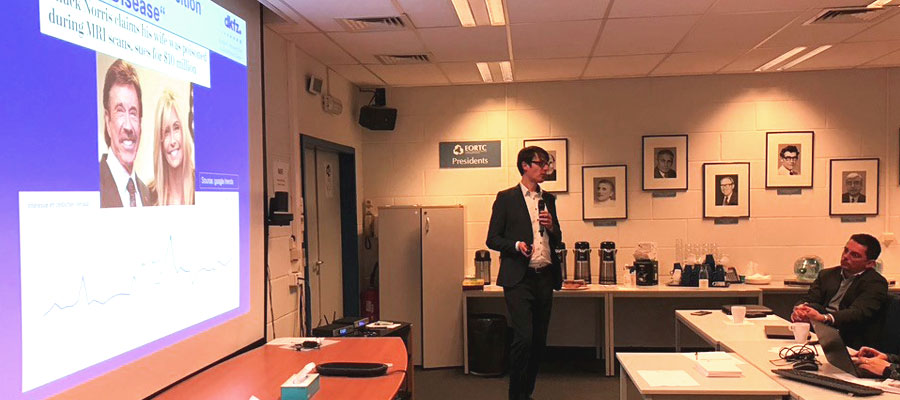Imaging Group: novel applications and opportunities for contrast and radionuclide agents
28 Sep 2020
For their 2020 general meetings, the Imaging Group invited world experts in the field of contrast and radionuclide agents for keynote lectures to discuss novel applications and opportunities, as well as concerns about safety and toxicity.
Facts and fables on Gadolinium retention with contrast-enhanced MRI
Professors Alexander Radbruch and Carlo Cosimo Quattrocchi lead various efforts to investigate the recent concerns about the retention of Gadolinium – in the brain as well as other sites in the body – after the administration of contrast for MRI. Reports of imaging findings consistent with the retention of Gadolinium led to the discontinuation of so-called linear Gadolinium-based contrast agents (GBCA’s) for most indications, while the use of the more stable macrocyclic GBCA’s is under scrutiny. As yet, there are no certain negative effects of Gadolinium retention, while the neurotoxic effects of free Gadolinium are well-known from preclinical studies. The use of GBCA’s should thus be reserved for clear clinical indications, and be critically evaluated in patients with many repeat examinations and a relatively long life expectancy, such as the pediatric population or screening in at-risk populations. Alternative contrast agents, as well as non-contrast enhanced imaging techniques, are a topic of active investigation in the MRI community.
For more information: https://www.ema.europa.eu/en/medicines/human/referrals/gadolinium-containing-contrast-agents
Professor Chaitanya Divgi, former head of nuclear medicine at Columbia University, New York, discussed the current status of imaging immunoncological (IO) therapy. He discussed well known pitfalls such as the discrepancy between response and survival benefit and pseudo- and hyperprogression. The adaptations to the RECIST framework for IO treatments (iRECIST) were highlighted, with an emphasis on how to deal with immune unconfirmed progressive disease (iUPD). This novel category can generate difficulties when comparing IO with non-IO control arms or with historical cohorts. He emphasized that the RECIST evaluation of radiological images constitutes a biomarkers, just as 18F-fluorodeoxyglucose PET assessment, and that they have to be integrated with other tissue or blood-derived biomarkers. He highlighted a number of very promising tracers allowing non-invasive quantification of CTLA4, PD-1, PD-L1, which could serve as predictive biomarkers, as well as pharmacodynamic biomarkers that show either recruitment of T-cells (CD8 minibodies) or T-cell activation (through granzyme B targeting). Validation and incorporation in multicenter trials will be key to future clinical adoption.
Professor Michael Hofman, the Director of the Prostate Theranostics and Imaging Centre of Excellence at the Peter MacCallum Cancer Center, Australia, offered a comprehensive overview of prostate-specific membrane antigen (PSMA) Theranostics. The principles of PSMA-based diagnostic and therapy were explained, using illustrative examples for the current indications in clinical practice. The results of the LuPSMA trial, the first prospective phase II study using [¹⁷⁷Lu]PSMA-617 radionuclide treatment in patients with metastatic castration-resistant prostate cancer were presented. Furthermore, the results of the proPSMA trial, the first phase III study in men with biopsy-proven prostate cancer prior to curative therapy, being randomized between conventional imaging (i.e., CT and bone scanning) and [68Ga]PSMA-11 PET-CT were reviewed. This key reference published in 2020 in Lancet provides evidence that PSMA PET-CT has better accuracy and greater treatment impact, with lower radiation exposure, compared with conventional imaging. Finally, preliminary results of ongoing Theranostics trials, Vision Trial and TheraP trial, were presented, underlying the power of this new game changer.
Related News
Meet the new EORTC Board
9 Jul 2024
We are pleased to announce the release of the EORTC 2023 Annual Report
17 Jun 2024
Dr Denis Lacombe, EORTC CEO, appointed stakeholder co-chair of ACT EU advisory group
24 May 2024
Clinical Trials Day 2024: a Q&A on pragmatic clinical trials
20 May 2024
EORTC/EMA workshop suggests an international way forward for treatment optimisation studies
8 May 2024
EORTC’s Participation at the ESTRO Congress 2024
29 Apr 2024
EORTC: Advancing research and treatment for rare cancers
29 Feb 2024
EORTC Fellowship Programme: celebrating more than 20 years of impactful collaboration
22 Feb 2024
Appointment of Malte Peters as EORTC Strategic Alliance Officer
9 Feb 2024
Unique series of workshops in partnership with the European Medicines Agency (EMA)
7 Feb 2024


